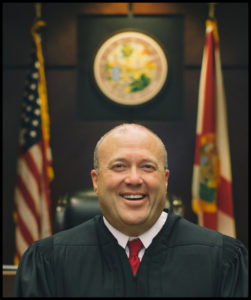
Safeguards help achieve fair and impartial juries
Ask Judge Smith
 Judge Layne Smith
Judge Layne Smith
Q. How does the justice system work to ensure that the juries sitting on criminal cases are fair and impartial to both sides? Carol
A. Carol, each criminal defendant has the right to a trial by an impartial jury and the clerk of court and the trial court work hard to ensure that occurs. Now, let’s cover how jurors are assembled, qualified and selected.
Random pools of jurors
Approximately 184,000 Leon County residents are eligible for jury service and multiple jury trials are held at the courthouse weekly. Four weeks out, the jury pool for a trial week is randomly selected by a computer algorithm which eliminates the risk of human bias. During 2018, 38,111 residents of Leon County were summonsed and approximately 22,867 of them served.
Qualification
When a jury pool is assembled, a judge puts them under oath and confirms they meet the minimum statutory qualifications. Prospective jurors can serve if they: 1) are at least 18 years-old; 2) are citizens of the United States; 3) reside in the county; and 4) have driver’s licenses or identification cards issued by the State or provide affidavits attesting to their eligibility.
Random Assignment
After prospective jurors have been qualified, a computer algorithm randomly seats them for the selection process.
Selection Process
After prospective jurors have been seated and instructed by the court, they answer questions and provide basic information about themselves.
Lawyers eliminate prospective jurors from service by exercising “for cause” and “peremptory” strikes.
For cause strikes
A prospective juror can’t serve if he or she has a bias or prejudice for or against a party. Each party can assert an unlimited number of challenges for cause. Let’s consider two examples.
In a driving while impaired case, a prospective juror whose child was killed by a drunk driver might be struck for cause. Likewise, in a grand theft case, a prospective juror whose wife was convicted of a crime by the same prosecuting attorney might be struck for cause.
Peremptory strikes and challenges
Each party may strike a set number of prospective jurors from serving without having to give any reason for doing so. One notable exception applies. A party may not eliminate a juror based solely on race, ethnicity or gender. If challenged, the lawyer must provide a neutral explanation that is supported by the record and found to be genuine by the trial judge.
Selection
Jury selection is open to the public. The process is recorded, preserved and subject to appeal. Every participant, including the trial judge, is accountable. Each juror promises under oath to be fair and impartial and to follow the court’s instructions on the law. Following these safeguards produces fair and impartial juries.
J. Layne Smith is a Leon County Judge who speaks and writes about civics, law, and the administration of justice. Email your questions to askjudgesmith@gmail.com.







